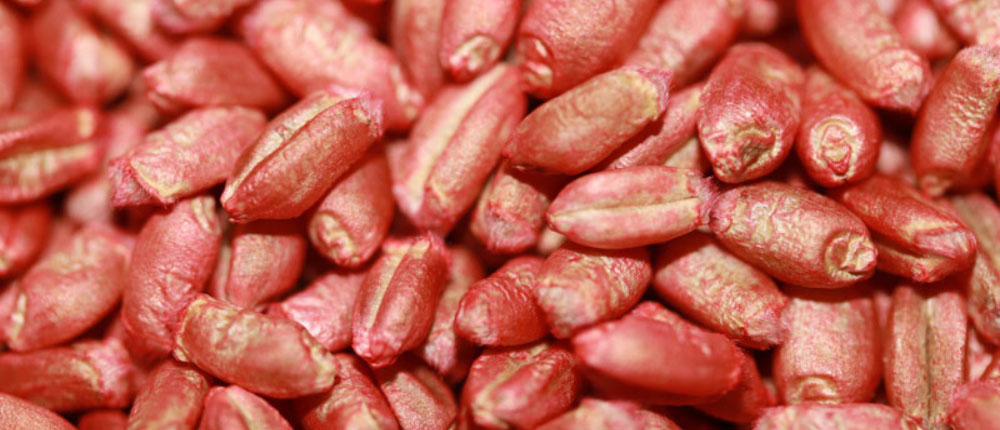With some areas having reduced moisture in the key grain fill timeframe for wheat, and those areas now receiving additional moisture during harvest, challenges will emerge for wheat seed quality used for fall seeding of wheat in 2022. Soil and seed-borne diseases pythium, fusarium head blight, and loose smut, have the potential to be an issue with the seed available for planting.
Pythium pressures early usually kills the seedling reducing the stand, also sub lethal pythium pressures are also yield robbing issue in area’s that raise high yielding wheat, which is signaled by slower emergence of the wheat plant. Symptoms are generally more noticeable in low lying areas. Infected roots are shorter, have few root hairs, and are necrotic. The outer layer of the root falls off easily. Symptoms can be observed from seedling stage to ripening.
Precinct is a modern systemic seed treatment fungicide that offers excellent control of select diseases, such Pythium spp. that is found in high yielding wheat environments. The product is quickly absorbed by the seed and spreads through the plant after germination leading to uniform distribution within the plant and less leaching or loss due to soil binding. Precinct protects the seed and the seedling at an early stage, resulting in a fast development and a uniform crop. Precinct is effective in both damp, colder conditions that are ideal for Pythium.
Fusarium head blight or scab infection may result in shriveled and shrunken kernels, lightweight bleached or tombstone kernels, or kernels that have a pinkish cast or discoloration. Lots with high levels of scab may have lower germination rates and can be more prevalent with moisture at harvest time. The fungus that causes scab can also cause a seedling blight of wheat. If scab infected seed is used for planting, seedling blights and stand establishment problems may occur. Management of Fusarium seedling blight would include using a fungicide seed treatment effective against seed-borne Fusarium or scab, such as Spirato® 480.
Loose smut would have been quite easy to see in the field at heading and early grain fill stages of growth. The kernels on infected heads are replaced with masses of powdery black spores so the heads have an obvious black, powdery appearance. Spores produced on smutted heads are wind carried to adjacent plants in the field and infect through the flowers. The fungus that causes loose smut survives within the embryo of wheat seeds. An infected seed does not show visible symptoms and will germinate normally. However, if an infected seed is planted, the plants growing from those seeds will be infected and develop smutted heads the next season. Loose smut is best controlled by using the proper rate of a systemic fungicide seed treatment labeled for the control of loose smut, such as Sativa® 309.
Seed treatment is an additional cost per acre and comes into question in terms of whether it will return a favorable ROI. The first thing to note is that poor emergence and final stand in the wheat field will never improve so the return potential for seed treatment use for the 2023 harvest season is very high. Pythium, fusarium head blight and loose smut are diseases that will affect your final yield potential. In addition, seed-borne fungi will reduce seedling vigor and emergence. Spirato 480 or fludioxonil provides protection against winter wheat seed-borne diseases. Loose smut and covered smut are diseases that affect the seedling plant. Sativa or Tebuconazole is very active against loose smut. Artect™ is a new combination fungicide for wheat seed treatment containing both Spirato 480 or fludioxonil and Sativa 309 tebuconazole plus a high level of pythium protection which is available for fall use in the 2022 season. Please contact your CHS supplier for more information.
Precinct, Spirato and Sativa are registered trademarks of Nufarm Americas Inc.
Artect is a registered trademark of CHS Inc.

Signs lead to ROI for 2022 wheat seed treatment
The 2022 growing season has had its challenges for spring planting activities and the ability to finish up grain fill on the current wheat crop.
Jun 9, 2022
Related news and stories

Seed treatments
26 Nov 2025
Strengthen early crop development with Abivium™, designed to support uniform stands and reliable season-long growth.

Seed treatments
27 Mar 2025
New nutritional seed lubricant protects and enhances early plant growth.



